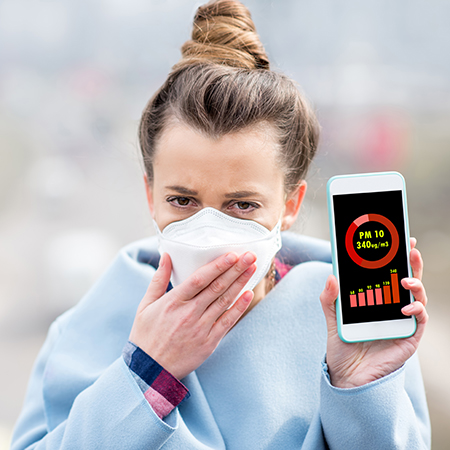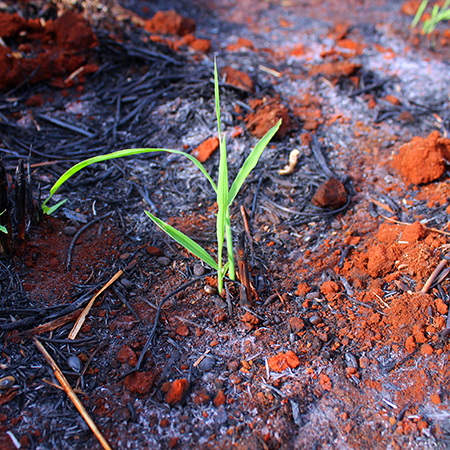A new report from Asthma UK and the British Lung Foundation is calling on the government to take action to reduce dangerous levels of air pollution across the UK. Hospitals and healthcare premises should also be involved with measures to reduce polluted air in and around their estates.
‘The invisible threat: how can we protect people from air pollution and create a fairer, healthier society’ reports that 29% of hospitals in England are in areas where emissions of fine particulate matter (PM2.5) exceeds World Health Organization (WHO) recommended levels, which is putting vulnerable patients, as well as healthcare professionals, at risk from breathing dirty air.
PM2.5 is the most worrying type of pollution that can penetrate deep into the lungs. While there are no safe levels of PM2.5, the WHO recommends that concentrations should not exceed 10 μg/m3. The current legal limit for PM2.5 in the UK is 20 μg/m3, twice the limit recommended by international health experts.
Air pollution is dangerous for everyone, but for the most vulnerable people in society, including older people who are more likely to suffer from lung disease or have weakened lungs from ageing, spikes in air pollution levels can put them at risk of breathing difficulties and having asthma attacks or COPD (chronic obstructive pulmonary disease) flare-ups. 59% of older people are living in areas where PM2.5 is above the levels recommended by WHO.
Exposure to air pollution increases the chance of a person dying early, developing lung cancer and cardiovascular disease. The research has even shown links with air pollution and cognitive decline, including dementia.
Asthma UK and the British Lung Foundation are urging the government to produce a national health protection plan for England overseen by a newly created air quality minister to safeguard those most at-risk from the effects of toxic air. This plan should include training for health professionals and an alert system that tells the general public when air pollution is going to be high, which directly informs care homes and medical centres so that those most at risk can protect themselves from harm.
The charities are also calling for the government to set out stronger clean air laws with targets in line with WHO guidelines and commitments to meet these by 2030 at the latest.
Action for hospitals to take
As key employers, controllers of large estates and a significant source of road journeys, the report says hospitals can be important catalysts for action – for both reducing air pollution and tackling exposure. Such action would also link with the net zero carbon programme, which will reduce the contribution the NHS itself makes towards air pollution.
The NHS Sustainable Development Unit has found that some 9.5 billion miles of all road travel in England is related to healthcare – patients, visitors, staff and suppliers to the NHS. Whilst the move to electric vehicles is welcome, this will not remove pollution, as the wear of tyres and brakes will still contribute PM2.5. Fewer vehicles on the road is the only answer, with more journeys taken by public transport, walking or cycling.
“Actions should be introduced to ensure that as many journeys to hospital are completed by sustainable means as possible, reducing the numbers of trips taken by car. Behaviour change programmes – driven by health bodies and employers – for staff, visitors and appropriate patients are needed to help encourage modal shift and get people out of their cars and onto (Covid-safe) public transport and using active travel.”
Landmark ruling
Last year, the verdict of the coroner at the inquest of nine-year-old school girl, Ella Kissi-Debrah, that air pollution had contributed to her death from asthma, has propelled the issue of dirty air to new levels. For the first time, anywhere in the world, air pollution featured on a death certificate, with the ruling that not enough was done to protect her.
“We’ve known about the deadly harm air pollution can cause for decades, it’s time now for urgent action,” says Professor Sir Stephen Holgate, Asthma UK and the British Lung Foundation Medical Adviser and Medical Research Council Clinical Professor of Immunopharmacology at the University of Southampton, who gave evidence at the inquest.
“We must honour Ella’s legacy by acting now and protecting other vulnerable people from the harmful effects of toxic air.”
Asthma UK and the British Lung Foundation have launched an online map where people can see how many care homes, medical centres and schools are located in highly polluted areas where they live and work.
We'd like to hear about any green travel plans or other initiatives to reduce air pollution around your hospital estates.










